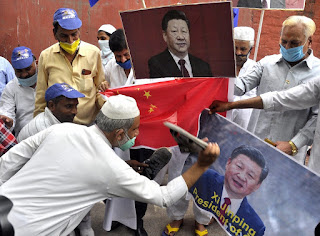Look who’s talking after banning Winnie the Pooh
“China is strongly concerned about the relevant notice issued by the Indian side. Indian government has the responsibility to uphold the legitimate and legal rights of the international investors including Chinese ones,” said Zhao Lijian, the Chinese Foreign Ministry Spokesperson, Tuesday after India banned 59 apps developed by the Chinese firms. china news
An authoritarian regime, which can’t even tolerate pictures of a honey-loving cartoon bear, trying to preach the principle of legitimacy to a democratic nation is as weird as it gets.
Some years ago, Winnie the Pooh vanished from the Chinese tv channels, social media and the Shanghai Disneyland just because people started comparing President Xi Jinping to the fictional teddy bear character created by English author A.A. Milne.
Google, Wikipedia, Facebook, Twitter, Instagram, YouTube, Blogger and thousands of other popular social media apps, search engines and websites are banned in China since long.
Is China upholding the legitimate and legal rights of the international investors in China? Has never been the case.
Crackdown on information has existed in China ever since the communists came to power in 1949 but The Golden Shield Project or the “great firewall of China” has grown stronger like never before under Xi’s rule.
South China Morning Post (SCMP) reported in 2018 how Zhuang Rongwen, the newly-appointed Director of the Cyberspace Administration of China (CAC), had “vowed to unswervingly strengthen Communist Party control over the world’s largest online population” and “double down and improve the promotion of Xi Jinping Thought online.”
The newspaper reported: “Under Xi’s administration, the party has already tightened its grip on the internet, silencing even the moderately critical voices that were previously tolerated as the Chinese web emerged as a relatively politically vibrant space with social media platforms including microblogs. He also called for all internet users to join party members and propagandists to fight a people’s war to rehabilitate the cyber ecology.”
Last year, when Facebook and Twitter took down accounts which allegedly spread disinformation backed by the Chinese government on the massive protests in Hong Kong, they were threatened with serious repercussions.
“Although marketing campaigns on Facebook and Twitter primarily target an overseas audience, Chinese companies that buy ads on the two may have to reconsider whether the national interest is now at stake,” Liu Guohong, a Director at Shenzhen-based think tank China Development Institute, was quoted as saying by the SCMP.
The report further said that “Facebook’s revenue in 2018 from China-based advertisers was estimated to account for about 10 per cent of total sales, or $5 billion, according to a note from Pivotal Research Group.”
This is how China, which is advising India to uphold the legitimate and legal rights of the international investors, is making everyone’s life miserable on its soil.
And yes, while one can easily access the hawkish, glaringly one-sided content of the state-run Chinese Communist Party’s mouthpiece Global Times in India, China has already blocked several major Indian dailies and websites at home after 20 Indian soldiers were killed in a violent face-off with the People’s Liberation Army in Ladakh, earlier this month.


Comments
Post a Comment